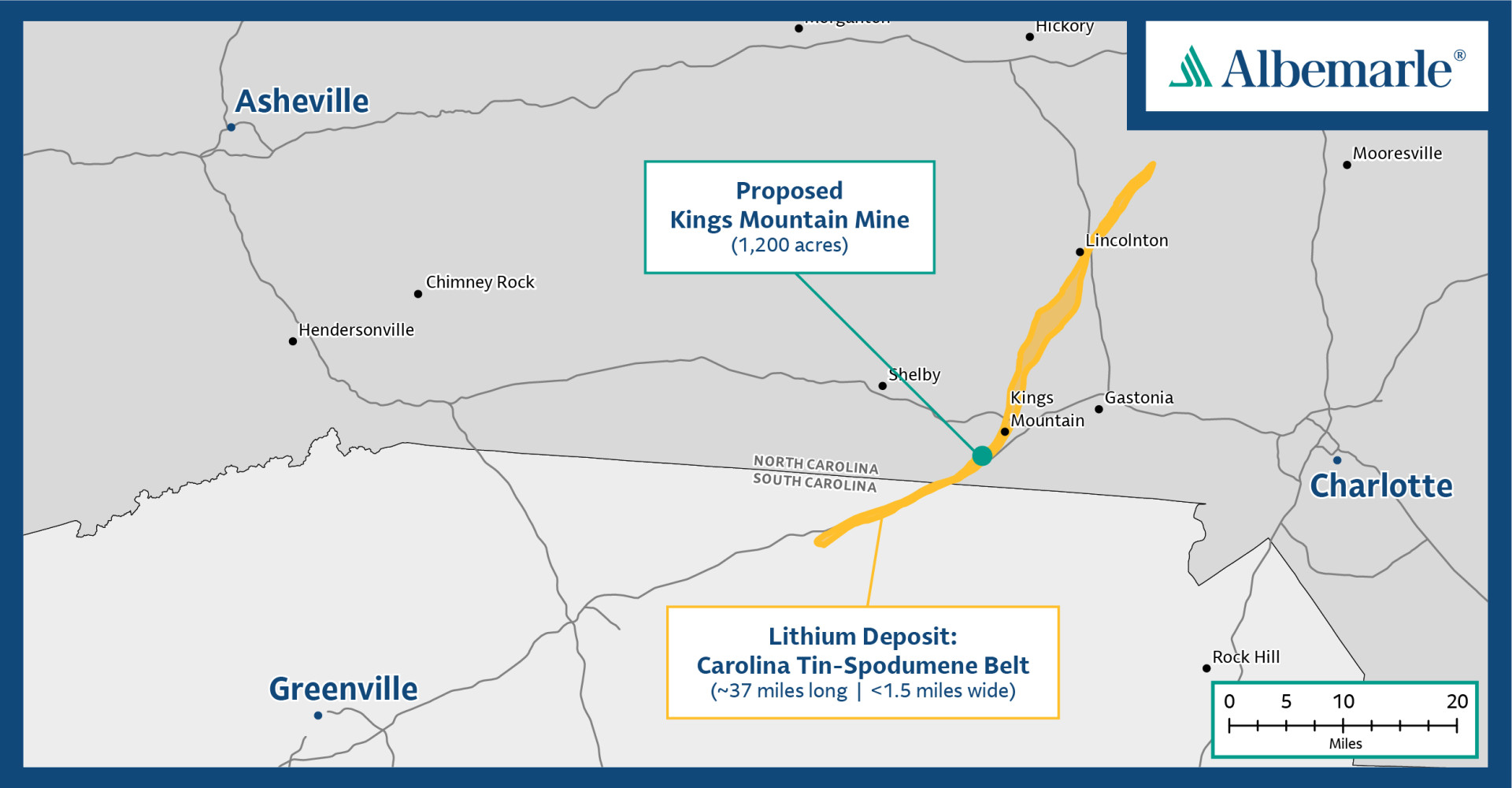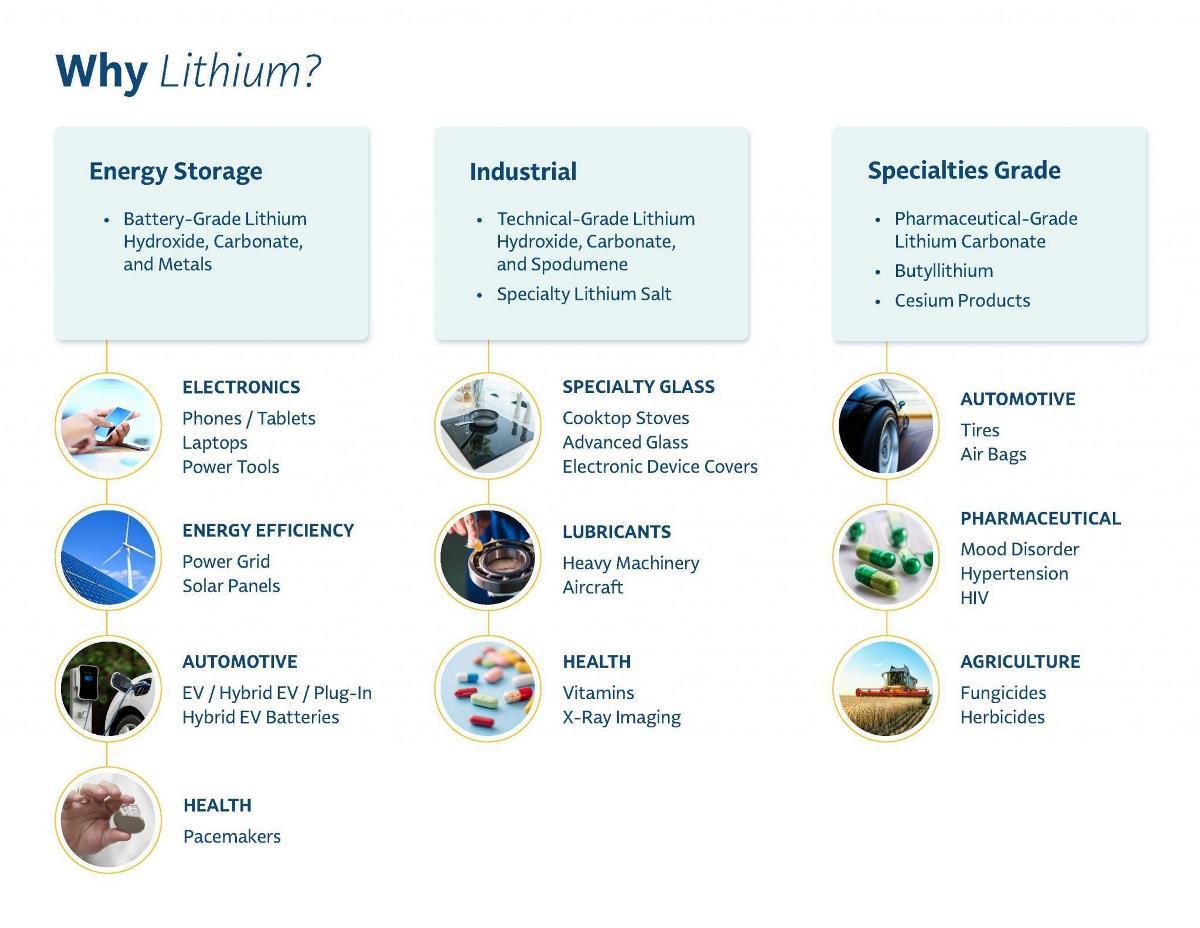Lithium is an element found naturally occurring in Earth’s crust. Unlike gold and copper, lithium is not found as a standalone element (otherwise known as a native element), but as part of compounds that make up minerals that make rocks.
When there is a significant amount of lithium-bearing rocks in a single area, we consider/call that a lithium deposit. Through mining and processing of the minerals and rocks that contain lithium, we can create a variety of non-naturally occurring lithium compounds such as lithium carbonate, lithium hydroxide, and lithium chloride.
The deposit found in Kings Mountain, North Carolina, is part of the Carolina Tin-Spodumene Belt. Located along the boundary of South and North Carolina and extending northeastward, the belt is only 37 miles long and less than 1.5 miles wide. This area is well known for its lithium resources. In fact, Kings Mountain is believed to have one of the largest resources in the world.
Hard rock lithium deposits, like those at Kings Mountain, are typically found in pegmatites, which are igneous rocks with very large crystals of granitic composition. Not all pegmatites have lithium, but those that do contain the minerals spodumene, lepidolite, and petalite. Spodumene is the most abundant lithium mineral at Kings Mountain. Hard rock pegmatite deposits often have higher concentrations of lithium than salt flats or brine pools, which can make them more cost-effective to mine.

Albemarle is currently assessing the existing site, looking at the geology and
other features to gather information needed to determine the extent of
the resources and collect the huge volume of data needed for economic
and environmental assessments and permitting. The environmental work
alone covers more than two dozen data collections and studies. These
assessments are expected to take three to four years.
If the decision is made to proceed, the existing pit would be
expanded with new extraction activities. This is referred to as a
brownfield development (restarting a previously disturbed site).
Generally speaking, an economically viable mine could potentially have an operating life of 20-30 years. Albemarle
plans to submit an initial permit application for ten years.
A mine closure and reclamation plan will be developed as part of the
prefeasibility study. This plan will be developed using input from the
Kings Mountain community to identify options to repurpose the site after
extraction operations are completed. Albemarle expects to revisit those plans throughout the life of the mine to confirm the plan is still agreeable.

The U.S. government is seeking to strengthen U.S. lithium-ion battery production by providing funding and resources for domestic lithium mining to reduce the country’s reliance on foreign lithium supply and increase the nation’s energy self-sufficiency. Albemarle is the recipient of two grants from the U.S. Department of Energy (DOE) and the U.S. Department of Defense (DOD) in support of lithium mining and manufacturing as a key part of the domestic supply chain of this critical material.
KEY POINTS:
- Lithium is used for batteries for electric vehicles (EVs), solar panels, renewable energy storage and other emerging clean energy technologies. The proposed project will help meet several national priorities presented in recent presidential Executive Orders spanning the current and most recent administrations dating back to 2017.
- Lithium-ion batteries are an essential part of the nation’s alternative energy strategy to reduce its reliance on fossil fuels.
- The redevelopment of the Kings Mountain Mine would support the DOE's Energy Strategic Goal of, “protecting our national and economic security by promoting a diverse supply and delivery of reliable, affordable, and environmentally sound energy."
U.S. DEPARTMENT OF DEFENSE CRITICAL MATERIALS GRANT
In 2023, the U.S. Department of Defense approved a $90 million grant for critical materials to Albemarle to help support the expansion of domestic mining and the production of lithium for the nation’s battery supply chain. Albemarle intends to use the funding to purchase a fleet of mining equipment as part of the planned redevelopment of the Kings Mountain Mine.
U.S. DEPARTMENT OF ENERGY GRANT
U.S. Department of Energy awarded a nearly $150 million grant to Albemarle as part of the first set of projects funded by the President's Bipartisan Infrastructure Law to expand domestic manufacturing of batteries for electric vehicles (EVs) and the electrical grid and for materials and components currently imported from other countries. The grant funding is intended to support a portion of the anticipated cost to construct a new, commercial-scale U.S.-based lithium mineral processing facility at the Kings Mountain Mine.
MORE RESOURCES
Lithium
is one of the world’s most important minerals. It helps power our lives
as a building block for modern battery technology, enabling
electrification, clean energy and sustainable transportation, particularly electric vehicles. It’s so critical that the pioneers of
lithium-ion battery technology won the Nobel Prize in chemistry in 2019
for their work in technology recognized as the “basis of our new
rechargeable world.”
Lithium compounds are used to manufacture many of the products we all use every day. Lithium carbonate and lithium hydroxide are needed for lithium-ion batteries in our mobile devices like smartphones and tablet computers, as well as in electric vehicles. Butyllithium is needed for the production of synthetic rubber for tires. Lithium organics are versatile tools for the synthesis of pharmaceuticals, agrochemicals, flavors and fragrances. The glass industry requires lithium carbonate or spodumene to improve the properties of glass. A cook plate made of glass ceramics would not exist without lithium carbonate as this ingredient reduces its thermal expansion. Lithium bromide is used in industrial absorption refrigeration systems installed in large buildings and industrial plants for air conditioning or process cooling.







